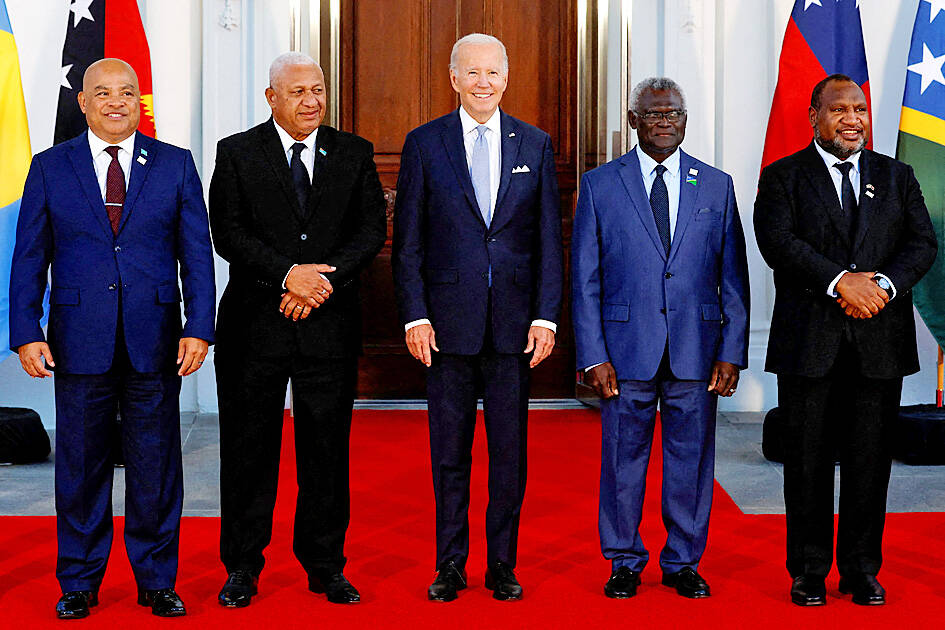Papua New Guinea (PNG) said it would sign a defense agreement with the US, ahead of a deal with Australia and despite opposition party concerns that it could upset China, because the Ukraine conflict shows the need for military capability.
Today, the Pacific island nation is to host visits by US Secretary of State Antony Blinken, Indian Prime Minister Narendra Modi, New Zealand Prime Minister Chris Hipkins and other Pacific island leaders.
While Modi’s visit is expected to focus on trade, Blinken is to sign a defense cooperation agreement (DCA) with PNG Prime Minister James Marape, the two nations have said.

Photo: Reuters
The agreement would boost PNG’s defense infrastructure and capability after decades of neglect, a government statement said on Saturday.
Highlighting domestic political sensitivity over taking sides in strategic competition between the US and China, the statement said the deal would “not stop Papua New Guinea from working with other nations including China.”
The defense agreement would also not give visiting US military personnel immunity for criminal conduct, the statement said.
“Assets developed under DCA will be owned by PNG Government,” it added.
The DCA is about building defense capabilities because border disputes are “inevitable in the future,” it said.
“Papua New Guinea does not have enemies, but it pays to be prepared,” it said, citing Russia’s invasion of Ukraine.
China, a major infrastructure provider to the Pacific islands, has sought to increase its security role, signing a security pact with the Solomon Islands that prompted criticism from the US and its allies about Beijing’s intentions.
While in PNG, Blinken and Palauan President Surangel Whipps Jr are today to sign a strategic agreement, before the US state secretary heads to Micronesia to sign a similar deal tomorrow, US Special Presidential Envoy for Compact Negotiations Joseph Yun said.
Yun said he hopes to conclude a deal with the Marshall Islands soon.
“We have made progress over my three-day visit to Marshall Islands and we hope to sign an agreement with the Marshall Islands in the coming weeks,” he said.
Washington reached what are known as Compact of Free Association (COFA) accords with the three island states in the 1980s, under which it retains responsibility for their defense and provides economic assistance while gaining exclusive access to huge strategic swathes of the Pacific in return.
Renewing them has become a key part of US efforts to push back against China’s bid to expand its influence in the region. Chinese diplomats have been courting the region and China’s construction and mining companies have expanded their business in many Pacific island nations.
The Marshall Islands’ COFA is due to expire this year. Yun gave no reason for the holdup in renewing it, but a parliamentary election is expected there in November.
Yun called the deals “strategically important.”
“We’ve achieved two out of three,” he said. “Compacts are very important for the United States. It defines the relationship between us and northern half of the Pacific.”

The Taiwanese passport ranked 33rd in a global listing of passports by convenience this month, rising three places from last month’s ranking, but matching its position in January last year. The Henley Passport Index, an international ranking of passports by the number of designations its holder can travel to without a visa, showed that the Taiwan passport enables holders to travel to 139 countries and territories without a visa. Singapore’s passport was ranked the most powerful with visa-free access to 192 destinations out of 227, according to the index published on Tuesday by UK-based migration investment consultancy firm Henley and Partners. Japan’s and

NATIONAL SECURITY THREAT: An official said that Guan Guan’s comments had gone beyond the threshold of free speech, as she advocated for the destruction of the ROC China-born media influencer Guan Guan’s (關關) residency permit has been revoked for repeatedly posting pro-China content that threatens national security, the National Immigration Agency said yesterday. Guan Guan has said many controversial things in her videos posted to Douyin (抖音), including “the red flag will soon be painted all over Taiwan” and “Taiwan is an inseparable part of China,” while expressing hope for expedited “reunification.” The agency received multiple reports alleging that Guan Guan had advocated for armed reunification last year. After investigating, the agency last month issued a notice requiring her to appear and account for her actions. Guan Guan appeared as required,

Japan and the Philippines yesterday signed a defense pact that would allow the tax-free provision of ammunition, fuel, food and other necessities when their forces stage joint training to boost deterrence against China’s growing aggression in the region and to bolster their preparation for natural disasters. Japan has faced increasing political, trade and security tensions with China, which was angered by Japanese Prime Minister Sanae Takaichi’s remark that a Chinese attack on Taiwan would be a survival-threatening situation for Japan, triggering a military response. Japan and the Philippines have also had separate territorial conflicts with Beijing in the East and South China

A strong cold air mass is expected to arrive tonight, bringing a change in weather and a drop in temperature, the Central Weather Administration (CWA) said. The coldest time would be early on Thursday morning, with temperatures in some areas dipping as low as 8°C, it said. Daytime highs yesterday were 22°C to 24°C in northern and eastern Taiwan, and about 25°C to 28°C in the central and southern regions, it said. However, nighttime lows would dip to about 15°C to 16°C in central and northern Taiwan as well as the northeast, and 17°C to 19°C elsewhere, it said. Tropical Storm Nokaen, currently